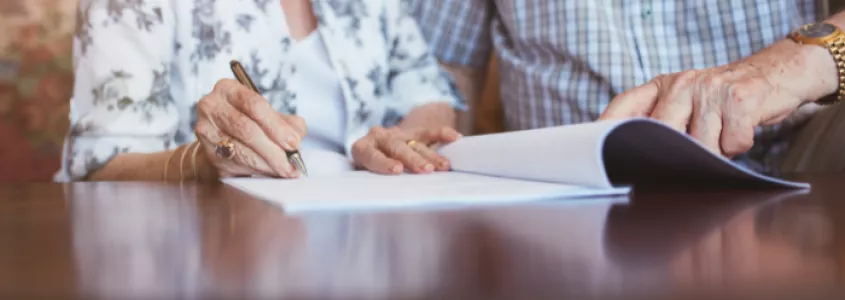
Table of contents
A will is the document by which a person decides how his or her assets will be distributed after death. However, although all legal experts in the field recommend doing so, not everyone draws it up and validates it before a notary. In such cases, how does the distribution of inheritance without a will take place? This is a question that we will answer here.
How can you know that a person has not left a will?
This is the first step. There are many cases in which the legitimate heirs have claimed the inheritance believing that the deceased had not drawn up a will during his or her lifetime and have later discovered that he or she had. In this sense, to find out this fact, it is necessary to consult the General Register of Last Will and Testament Acts.
In fact, the notary's task, in addition to attesting to the will of the person in question, is to make known to the register the name of the testator and the notary, as well as the date and place of the execution of the will. However, it does not specify anything about the content, which is known only to both of them. This is why it is necessary to go to the notary's office when dividing an inheritance in the form of a will.
Leaving this aside, as it is not the subject that concerns us, to find out if the deceased has left a will, you will have to request a Certificate of Last Will and Testament. You can do this in person at the corresponding Regional Office of the Ministry of Justice and through the Electronic Headquarters of the Ministry of Justice.
Now, how is the distribution of an inheritance without a will carried out?
You have just obtained the Certificate of Last Will and Testament and it specifies that the deceased did not leave a will. In that case, the right to receive the inheritance does not disappear as long as the current legislation considers you as a legal heir of the deceased.But who inherits if there is no will? The law establishes at state level an order of succession. It is true that some autonomous communities have made variations, but they are few and of little importance. The best example is Catalonia, which places the widow or widower on the second rung (not the third, as we will see below).
The descendants of the deceased
These are, of course, the children. Each of them must receive the same amount as inheritance. Also the grandchildren, if there are any.
For example, if a deceased person leaves two children and two grandchildren and an inheritance of €300,000, each of these children will receive €100,000, while the two grandchildren will share the remaining third (€50,000 each).
At this point we have to talk about the distribution of inheritance without a will between widow and children. The reason for this is that the spouse of the deceased is also entitled to a share, but only as usufructuary. This will be the equivalent of the third of improvement.
The ascendants of the deceased
It may be the case that a young person dies without a partner and without children. In this case, the legal heirs will be his or her parents. In fact, if only one of them survives, he or she will be the legal heir. If they are not alive either, the right will pass to the grandparents.
On the other hand, it is possible that the deceased was married but had no children. In this case, the widow or widower is entitled to the usufruct of half of the inheritance.
The widow/widower of the deceased
It is possible that the deceased had no descendants or ascendants, i.e. neither children nor parents or grandparents. In this case, it is the spouse who will inherit all the assets. In this regard, it should be noted that the unmarried partner is only equated to the spouse in inheritance matters in certain autonomous communities. In many others, it is not.
The siblings of the deceased
In order for the siblings of the deceased to be the heirs without a will, the deceased must have left no children during his lifetime, his parents and grandparents must be deceased and he must not have had a husband or wife. In this case, the inheritance will be divided equally between them.
However, it may happen that one, several or all of the deceased's siblings die before him/her. What happens in this case? Well, it will be the nephews and nieces who will receive the inheritance.However, the distribution will be made 'by lineage'. By this we mean that the inheritance will be divided equally between the siblings and, subsequently, the amount that corresponds to each nephew or niece will be given according to the number of siblings.
For example, imagine two brothers who have died out of a total of four. The first had two children and the second had four. Each of them, if they were alive, would receive €100,000 (as would the other two who survive). In the first case, each of the two nephews would get €50,000. In the second case, €25,000.
The deceased's nephews and nieces
In the event that all the deceased's siblings have died before him/her, the nephews and nieces will share the inheritance equally. In other words, in this case, the above-mentioned formula of lineages does not apply.
The collateral relatives of the deceased up to the fourth degree of consanguinity.
In particular, we are talking about the aunts, uncles and/or cousins of the deceased. The distribution, at this point, would be made in the same way as for siblings.
El Estado
In the event that the legal heirs renounce the inheritance or, failing that, do not exist, the beneficiary of the deceased's assets will be the State.
In short, we hope we have made it clear what are the inheritance procedures without a will, how it is distributed and what is the order of succession. However, we cannot finish without emphasising the importance of drawing up this document during the deceased's lifetime, as it undoubtedly makes things much easier.

"Anywhere in Spain"
With our online appointment system you will have immediate advice without the need for face-to-face visits or travel.
One of our lawyers specialized in your area of interest will contact you to formalize an appointment and make your consultation by video call.

Add new comment